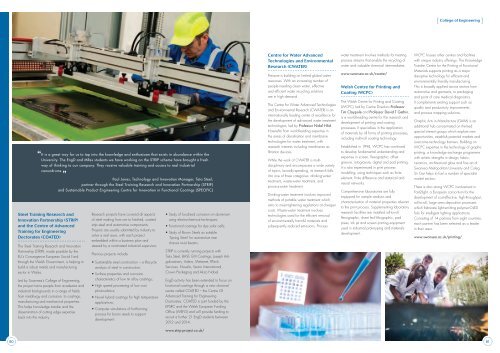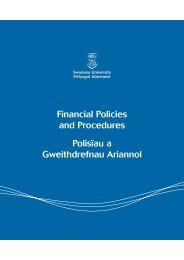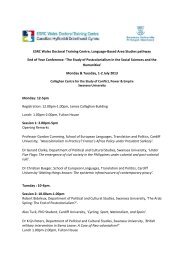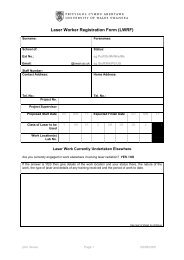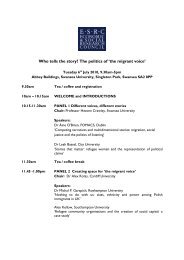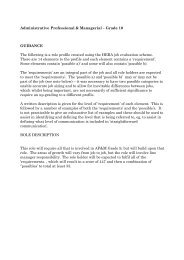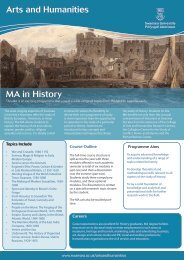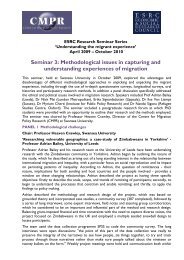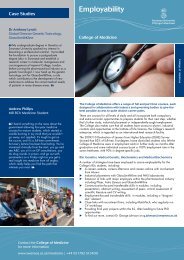College of Engineering - Swansea University
College of Engineering - Swansea University
College of Engineering - Swansea University
Create successful ePaper yourself
Turn your PDF publications into a flip-book with our unique Google optimized e-Paper software.
]<br />
<strong>College</strong> <strong>of</strong> <strong>Engineering</strong> ]<br />
“It is a great way for us to tap into the knowledge and enthusiasm that exists in abundance within the<br />
<strong>University</strong>. The EngD and MRes students we have working on the STRIP scheme have brought a fresh<br />
way <strong>of</strong> thinking to our company. They receive valuable training and access to real industrial<br />
conundrums.<br />
”<br />
Paul Jones, Technology and Innovation Manager, Tata Steel,<br />
partner through the Steel Training Research and Innovation Partnership (STRIP)<br />
and Sustainable Product <strong>Engineering</strong> Centre for Innovation in Functional Coatings (SPECIFIC)<br />
Steel Training Research and<br />
Innovation Partnership (STRIP)<br />
and the Centre <strong>of</strong> Advanced<br />
Training for <strong>Engineering</strong><br />
Doctorates (COATED)<br />
The Steel Training Research and Innovation<br />
Partnership (STRIP), made possible by the<br />
EU’s Convergence European Social Fund<br />
through the Welsh Government, is helping to<br />
build a robust metals and manufacturing<br />
sector in Wales.<br />
Led by <strong>Swansea</strong>’s <strong>College</strong> <strong>of</strong> <strong>Engineering</strong>,<br />
the project trains people from academia and<br />
industrial backgrounds in a range <strong>of</strong> fields<br />
from metallurgy and corrosion, to coatings,<br />
manufacturing and mechanical properties.<br />
This helps knowledge transfer and the<br />
dissemination <strong>of</strong> cutting edge expertise<br />
back into the industry.<br />
Research projects have covered all aspects<br />
<strong>of</strong> steel making from ore to finished, coated<br />
strip steel and automotive components.<br />
Projects are usually submitted by industry to<br />
solve a real issue, with each project<br />
embedded within a business plan and<br />
steered by a nominated industrial supervisor.<br />
Previous projects include:<br />
• Sustainable steel construction – a lifecycle<br />
analysis <strong>of</strong> steel in construction;<br />
• Surface properties and corrosion<br />
characteristics <strong>of</strong> low tin alloy coatings;<br />
• High speed processing <strong>of</strong> low cost<br />
photovoltaics;<br />
• Novel hybrid coatings for high temperature<br />
applications;<br />
• Computer simulations <strong>of</strong> hot-forming<br />
process for boron steels to support<br />
development;<br />
• Study <strong>of</strong> localised corrosion on aluminium<br />
using electrochemical techniques;<br />
• Functional coatings for dye solar cells;<br />
• Study <strong>of</strong> Boron Steels as suitable<br />
‘Spring Steel’ for automotive rear<br />
chassis twist beams.<br />
STRIP is currently running projects with<br />
Tata Steel, BASF, EM Coatings, Joseph Ash<br />
galvanisers, Valero, Metamet, RTech<br />
Services, Novelis, Vector International,<br />
Crown Packaging and Akzo Nobel.<br />
EngD activity has been extended to focus on<br />
functional coatings through a new doctoral<br />
centre called COATED – the Centre Of<br />
Advanced Training for <strong>Engineering</strong><br />
Doctorates. COATED is joint funded by the<br />
EPSRC and the Welsh European Funding<br />
Office (WEFO) and will provide funding to<br />
recruit a further 21 EngD students between<br />
2012 and 2014.<br />
Centre for Water Advanced<br />
Technologies and Environmental<br />
Research (CWATER)<br />
Pressure is building on limited global water<br />
resources. With an increasing number <strong>of</strong><br />
people needing clean water, effective<br />
and efficient water recycling solutions<br />
are in high demand.<br />
The Centre for Water Advanced Technologies<br />
and Environmental Research (CWATER) is an<br />
internationally leading centre <strong>of</strong> excellence for<br />
the development <strong>of</strong> advanced water treatment<br />
technologies, led by Pr<strong>of</strong>essor Nidal Hilal.<br />
It benefits from world-leading expertise in<br />
the areas <strong>of</strong> desalination and membrane<br />
technologies for water treatment, with<br />
research interests including membranes as<br />
filtration devices.<br />
While the work <strong>of</strong> CWATER is multidisciplinary<br />
and encompasses a wide variety<br />
<strong>of</strong> topics, broadly-speaking, its research falls<br />
into one <strong>of</strong> three categories: drinking-water<br />
treatment, waste-water treatment, and<br />
process-water treatment.<br />
Drinking-water treatment involves improved<br />
methods <strong>of</strong> potable water treatment which<br />
aims to meet tightening regulations at cheaper<br />
costs. Waste-water treatment involves<br />
technologies used for the efficient removal<br />
<strong>of</strong> environmentally harmful materials and<br />
subsequently reduced emissions. Processwater<br />
treatment involves methods for treating<br />
process streams that enable the recycling <strong>of</strong><br />
water and valuable chemical intermediates.<br />
www.swansea.ac.uk/cwater/<br />
Welsh Centre for Printing and<br />
Coating (WCPC)<br />
The Welsh Centre for Printing and Coating<br />
(WCPC), led by Centre Directors Pr<strong>of</strong>essor<br />
Tim Claypole and Pr<strong>of</strong>essor David T Gethin,<br />
is a world-leading centre for the research and<br />
development <strong>of</strong> printing and coating<br />
processes. It specialises in the application<br />
<strong>of</strong> materials by all forms <strong>of</strong> printing processes,<br />
including multi-roll coating technology.<br />
Established in 1994, WCPC has continued<br />
to develop fundamental understanding and<br />
expertise in screen, flexographic, <strong>of</strong>fset<br />
gravure, rotogravure, digital and pad printing.<br />
It is also experienced in print process<br />
modelling, using techniques such as finite<br />
element, finite difference and statistical and<br />
neural networks.<br />
Comprehensive laboratories are fully<br />
equipped for sample analysis and<br />
characterisation <strong>of</strong> material properties relevant<br />
to the print process. Supplementing laboratory<br />
research facilities are installed roll-to-roll<br />
flexographic, sheet fed lithographic, pad<br />
press, ink jet and screen printing equipment<br />
used in industrial prototyping and materials<br />
development.<br />
WCPC houses other centres and facilities<br />
with unique industry <strong>of</strong>ferings. The Knowledge<br />
Transfer Centre for the Printing <strong>of</strong> Functional<br />
Materials supports printing as a major<br />
disruptive technology for efficient and<br />
environmentally friendly manufacturing.<br />
This is broadly applied across sectors from<br />
automotive and garments, to packaging<br />
and point <strong>of</strong> care medical diagnostics.<br />
It complements existing support such as<br />
quality and productivity improvements<br />
and process mapping solutions.<br />
Graphic Arts in Manufacture (GAIM) is an<br />
additional hub concentrated on themed<br />
special interest groups which explore new<br />
opportunities, establish potential markets and<br />
overcome technology barriers. Building on<br />
WCPC expertise in the technology <strong>of</strong> graphic<br />
printing, a knowledge exchange programme<br />
with artistic strengths in design, fabric,<br />
ceramics, architectural glass and fine art <strong>of</strong><br />
<strong>Swansea</strong> Metropolitan <strong>University</strong> and Coleg<br />
Sir Gar helps to fuel a number <strong>of</strong> specialist<br />
market sectors.<br />
There is also strong WCPC involvement in<br />
Fast2light, a European consortium for the<br />
development <strong>of</strong> cost-effective, high-throughput,<br />
roll-to-roll, large area deposition processes<br />
which fabricate light-emitting polymer-OLED<br />
foils for intelligent lighting applications.<br />
Consisting <strong>of</strong> 14 partners from eight countries,<br />
each partner has been selected as a leader<br />
in their area.<br />
www.swansea.ac.uk/printing/<br />
www.strip-project.co.uk/<br />
80<br />
81


